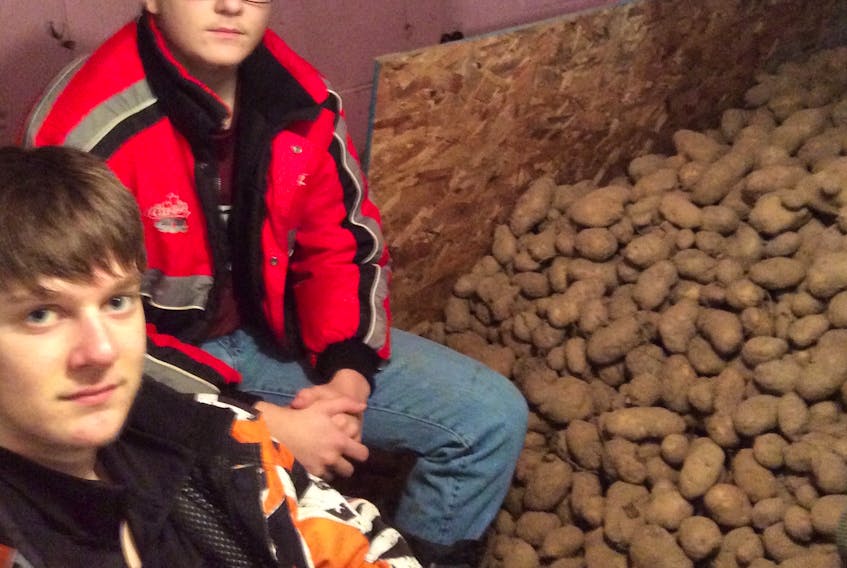CODROY, N.L. — Three goats wander around the gravel driveway, only pausing in their constant search for food to inspect passersby.
Close by, two ponies arch elegant necks over the fence, seeking nose rubs. A huge, white Labrador mix keeps careful watch from the back deck, one of six dogs owned by the O’Gorman family.
This is a working farm, with 85 laying hens that produce eggs the family sells locally. There are 80 milking cows to be tended to daily. The O’Gormans have five children and an exchange student from Brazil to help out with all the work.
“We’re the only Jersey farm on the island,” offers patriarch Robert O’Gorman. He’s been working this farm for 30 years, since he was a boy.
When they aren’t attending school, doing chores, playing basketball or hanging out with friends, 16-year-old Jordan and 15-year-old Alex are running their own side business. Under the guidance of their father, Robert, the brothers grew 6,000 pounds of russet potatoes last year.
“Make some money,” laughs Alex, then adds, “Dad forced me.”
All that hard work paid off. Alex bought himself a quad in April. Jordan is hoping to buy a car after this year’s harvest.
Robert’s strategy for getting his sons involved in potato farming is threefold.
He’s giving his children valuable job experience and responsibility, helping them earn spending money and, perhaps most important, he's hoping to entice one of them into making agriculture a career so he can some day pass on the 600-acre family farm.
“My father started it when I was small, and I just stayed home. My sister joined the military. I didn’t want to join the military. I stayed home and farmed and now I’m trying to get them guys into it,” he says, motioning to his two sons. “The average age for a dairy farmer in Canada is 65.”
Alex says he's enjoying it, though he finds it difficult to choose just exactly what he likes best.
“The work,” he shrugs, before adding, “Driving tractors.”
Jordan is less keen. “I don’t know yet. I haven’t planned that far ahead.”
The boys only had success with the potatoes, to varying degrees. When the soil’s too dry, the number of potatoes per plant is reduced.
“We tried to grow corn and other stuff up there last year,” says Alex of one field. “Not very good.”
“You’ve got to have a hot year for corn,” notes Robert. “It was cold at first, then it got hot and too dry.”
Typically corn would be planted soon, but even in the valley this spring the soil is still too cold. The boys will focus on increasing their potato crop instead, but it’s too cold for that, too. They estimate mid-June before they can start sowing the field.
The best place to plant potatoes is near the ocean. Robert says the saltwater breeze tends to bring in a higher yield per plant.
If Alex does choose to make this his career, he can take agricultural courses at college. But right now the family largely works this farm the old-fashioned way, save for the tractor and four-pronged milking unit. Major technological upgrades are expensive.
“The new robotic milkers now, the computer does it all by itself,” says Robert.
In September when the crop is harvested, the potatoes will be sold at local stores in the Codroy Valley and a few other stores in Burnt Islands and Isles aux Morts. Signs will be posted near the driveway entrance so passersby can buy directly at the farm. They sell 10-pound bags of pesticide-free, organically-grown potatoes for $5 per bag.
Robert agrees a life of farming is difficult and for those who take on the challenge, it's largely rooted in passion.
“You don’t get no days off,” says Robert. “I haven’t had a holiday now in two years.”
Making the industry more appealing to youth means it must become more financially viable. The boys are using last year’s seed potatoes, but they’ve already spent $2,000 on bags and fertilizer for this year’s crop and nothing has been planted.
“The problem here in Newfoundland is that people have to buy local and right now I’m selling potatoes for five dollars for a 10-pound bag, but the ones coming in from P.E.I. are cheaper than mine, so what are people going to buy? They’re going to buy the ones that are cheaper, but that there is loaded with spray and these are not,” says Robert. “Local people are trying to farm, but if you’re (consumers) going to buy outside, you’re not going to be able to keep it going.”
Robert says that over in O’Regan’s, a cattle and sheep farmer is facing a similar problem.
“He needs to sell his beef local, but the price is four dollars a pound and people say, ‘I can get it cheaper at Foodland’ but what are you buying?”
He believes consumers choosing local produce and support from the provincial government would do a lot to help. He suggests putting Newfoundland milk products in schools, hospitals and other government buildings would create a bigger demand. As well, it could help to warehouse local produce to push through grocery store chains.
“Right now, if we grow potatoes this year and get a big crop, we have no place to get rid of them. Hopefully the stores will buy them,” says Robert. “The solution is that the government has to get behind local farmers and sell their crop first.”
If Alex is going to make his livelihood as a farmer, some solution must be found.
“The work is not here. There’s less stores, less gas stations, less everything, less people growing food,” says Robert, motioning at Alex. “Some day the age-65-and-over club is not going to be here, so their age is going to have to take over. Somebody’s got to grow food, and there’s going to have to be money into it because (otherwise) young people aren’t going to do it.”
For more information on provincial agricultural funding, visit: https://www.flr.gov.nl.ca/agriculturesummit/pdf/Funding_Programs_Guide_Businesses_Agriculture.pdf.









